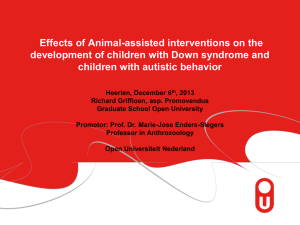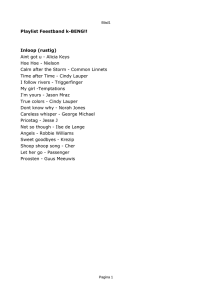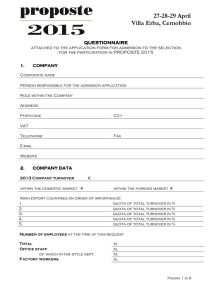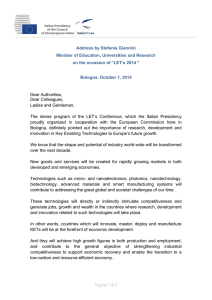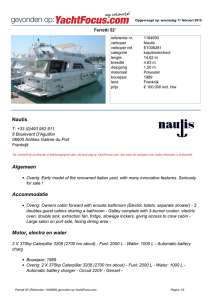Bank balans optimalisatie
advertisement
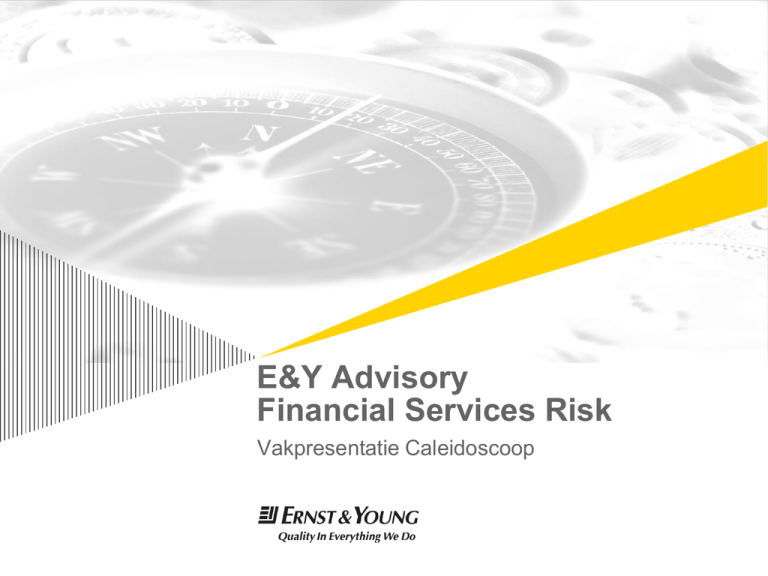
E&Y Advisory Financial Services Risk Vakpresentatie Caleidoscoop Contacts ► Diederik Fokkema ► ► ► diederik.fokkema@nl.ey.com (088) 407 08 36 Hans Hellemons ► ► hans.hellemons@nl.ey.com (088) 407 21 80 Pagina 2 Agenda ► Introductie ► ► ► ► ► Terugblik vorige week ► ► ► Wie zijn wij? Wat doen wij? Wie zoeken wij? Wat bieden wij? Theorie portfolio optimalisatie Opdracht uitwerken Bank balans optimalisatie Pagina 3 Wie zijn wij? – Ernst & Young ► Aantal medewerkers in NL: 4.600 ► 56% man, 44% vrouw ► Gemiddelde leeftijd 34 jaar ► Aantal locaties: 15 ► Hoofdkantoor: Rotterdam Boompjes ► Assurance, Advisory, Tax, Transactions Pagina 4 Wie zijn wij? – Advisory Geographical Area Service Lines EMEIA Assurance Risk BeNe Sub-service lines FS Risk Tax Advisory Transaction Advisory Services Performance Improvement ITRA Actuarial Services Financial Clients Pagina 5 Wie zijn wij? – FSRisk ► ► ► ► FSRisk bestaat uit ± 55 collega’s Standplaats kantoor Amsterdam Lokaal team met een internationale oriëntatie Jong, ambitieus en snel groeiend team ► Staat bekend om: ► ► ► ► Pagina 6 Kennisgericht Kwaliteitsgericht No-nonsense … en een grote verscheidenheid aan competenties Wie zijn wij? – FSRisk - quant Achtergrond ► Econometrie, wiskunde, statistiek, BWI, natuurkunde, scheikunde en (bedrijfs)economie ► Gezonde affiniteit met de financiële wereld Uitdagingen ► Je kennis gebruiken op nieuwe terreinen ► Een schakel zijn bij grote projecten ► Commerciële en communicatieve vaardigheden ontwikkelen Wat doen wij? - Klanten Vermogens beheerders Retail Banking Verzekeraars Pensioen fondsen Wholesale Banking (Commodity) Traders FSRisk KLANTEN Market Makers Energie bedrijven Vastgoed investeerders Treasury bij Corporates en Non-profit Pagina 8 Overige financials Wie zoeken wij? – ‘de beste mensen’ De FSRisk’er is: ► ► ► ► ► ► Pagina 9 Ondernemend Ambitieus Innovatief & creatief Communicatief sterk Team speler Vaktechnisch sterk Programma ► Terugblik naar vorige week ► ► ► Terminologie rondom portfolio optimalisatie Excel demo Bank balans optimalisatie ► ► Probleemstelling Wiskundige problemen ► CVaR optimalisatie Pagina 10 Terugblik vorige week ► Portfolio optimalisatie ► ► ► ► “Het toewijzen van kapitaal aan een portfolio van activa (e.g., aandelen) om zo de winst te maximaliseren en/of het risico te minimaliseren.” Terminologie Mean-variance portfolio optimization Efficient frontier Pagina 11 Terugblik vorige week: terminologie ► Consider a portfolio consisting of n assets. The weights to each asset is given by a decision vector , , with ► being the position in asset i and The returns on the assets are denoted by a random vector , such that represents the return on asset i. Consequently, the expected rates of returns are defined as and the expected portfolio return equals Pagina 12 Terugblik vorige week: terminologie ► The variance of the return on asset i (i.e., the variance of a random variable) is given by ► And the covariance between asset i and j is defined as Pagina 13 Terugblik vorige week: terminologie ► Subsequently, the variance of a portfolio consisting of n assets is given by ► Or in matrix notation as , with representing the covariance matrix Pagina 14 Terugblik vorige week: terminologie ► An efficient portfolio is defined as an allocation of assets that maximizes the returns for a certain level of risk ► Here represents the maximum level of risk. Additionally an extra constraint on the bounds can be added here and bound Pagina 15 respectively represent the lower and upper Terugblik vorige week: terminologie ► Alternatively, a combination of assets that minimizes the risk for a certain level of return is given by ► Here denotes the minimum level of required return Pagina 16 Terugblik vorige week: terminologie ► The efficient frontier is defined as a curve that shows all efficient portfolios in a risk-return framework. ► ► ► First calculate the solution to the optimization where the return is maximized, while ignoring the risk constraint. This gives an upper bound on the expected return, Secondly, calculate the solution to the optimization where the risk is minimized, while ignoring the return constraint. This gives a lower bound on the expected return, Finally, the efficient is obtained by solving the last optimization problem (including the risk constraint) for a certain number of required returns on the interval Pagina 17 Terugblik vorige week: opdracht ► Excel demo Pagina 18 Bank balans optimalisatie ► Portfolio approach for bank balance sheet optimization ► ► Balance sheet is a summary of the financial balances as of a specific date (e.g., end of financial year) Financial balances include ► ► ► ► Assets Liabilities Shareholder’s equity The following should hold: ► Total value assets = total value liabilities + shareholder’s equity Pagina 19 Bank balans optimalisatie ► A stylized bank’s balance sheet looks as follows Pagina 20 Bank balans optimalisatie ► ► ► ► Assets on the balance sheet produce a positive return, whereas liabilities produce a negative return This is respectively translated to interest income and interest expenses Shareholder’s equity does not make any return Now consider the stylized balance sheet as a portfolio consisting of 7 asset instruments and 4 liability instruments (n=11) ► ► Here the decision vector denotes the positions in the optimal portfolio And each instrument has a certain return, which is denoted by the return vector Pagina 21 Bank balans optimalisatie ► Ultimately led to the following non-linear optimization problem ► ► ► Conditional Value-at-Risk (CVaR) minimization function Given a confidence level , the conditional expectation of the portfolio losses above the -percentile are minimized (worst-case scenarios) J is the number of scenarios Pagina 22 Bank balans optimalisatie ► Ultimately led to the following non-linear optimization problem ► ► Mean retained earnings ( ) should be higher than expected retained earnings This constraint is comparable to Pagina 23 Bank balans optimalisatie ► Ultimately led to the following non-linear optimization problem ► ► Constraints needed for CVaR optimization objective function, such that only the worst-case scenarios are taken into account is a complex loss function (explained later) Pagina 24 Bank balans optimalisatie ► Ultimately led to the following non-linear optimization problem ► The weights to all assets instruments should add up to 1 Pagina 25 Bank balans optimalisatie ► Ultimately led to the following non-linear optimization problem ► The weights to all liability instruments and equity instruments should also add up to 1, such that the balance sheet is in “balance” ► Total value assets = total value liabilities + shareholder’s equity Pagina 26 Bank balans optimalisatie Ultimately led to the following non-linear optimization problem ► ► ► ► ► Constraints on the maximum weight shift per portfolio instrument. Here denotes the initial portfolio weight for asset i The lower and upper bounds for the maximum shift are given by and respectively Pagina 27 Bank balans optimalisatie ► Ultimately led to the following non-linear optimization problem ► Constraint on the lower and upper bounds for the portfolio weights Pagina 28 Bank balans optimalisatie ► Ultimately led to the following non-linear optimization problem ► Lower bound is greater than 0 Pagina 29 Bank balans optimalisatie ► Ultimately led to the following non-linear optimization problem ► ► ► Banks are subjected to strict regulation, prescribed by the BIS (Bank of International Settlements), such that a bank resistant to several types of risk Recently the BIS released new regulation, called Basel III Constraints to comply to Basel III Pagina 30 Bank balans optimalisatie ► Most important risk types for banks ► ► ► ► Credit risk: the risk of loss arising from the default by a creditor or a counterparty Market risk: the risk of losses in on and off-balance-sheet positions arising from movements in market prices Operational risk: the risk of direct or indirect loss resulting from inadequate or failed internal processes, people and systems, or from external events Liquidity risk: the risk that the bank is unable to meet expected and unexpected current and future cash flows without affecting either daily operations or the financial condition of the firm Pagina 31 Bank balans optimalisatie ► Banks are required by regulation (Basel III) to ► ► Keep a certain amount of capital available for credit, market and operational risk Have a liquidity buffer (consisting of assets that are considered easily converted into cash) available for liquidity risk Pagina 32 Bank balans optimalisatie ► Mathematical techniques/difficulties ► Creating the scenario set ► ► ► ► ► From January 2003 to December 2012 Monthly returns (120 scenarios) Conditional Value-at-Risk optimization for trading portfolio Dynamic Conditional Correlation (DCC) GARCH model for trading portfolio Non-linear optimization problem was implemented using in R, software for statistical computing, and optimized using a sequential quadratic programming (SQP) algorithm from NLOPT (a free/open-source library for nonlinear optimization) Pagina 33 Bank balans optimalisatie: CVaR optimization ► ► ► The model includes daily returns of 10 equity indices (e.g., AEX, NASDAQ, S&P 500) and 5 commodity indices (energy, industrial metals, precious metals, livestock and agriculture) Each month the trading portfolio had to be optimized Trading portfolio is subjected to market risk ► ► ► The risk of losses in positions arising from movements in market prices Regulation requires banks to hold capital against this market risk Capital consists of the 10-day 99% Value-at-Risk (VaR) of the trading portfolio Pagina 34 Bank balans optimalisatie: CVaR optimization ► 99%-VaR is minimum amount of capital such that, with probability 99%, the loss will not exceed this amount. ► ► VaR measure lacks convexity when calculated using scenarios 99%-CVaR is the conditional expectation of the losses exceeding the 99%-VaR ► ► CVaR can be optimized by optimization algorithms By definition: CVaR ≥ VaR Pagina 35 Bank balans optimalisatie: CVaR optimization ► CVaR optimization problem Minimize the conditional expectation of the losses above the threshold (i.e., α-VaR level) For each of the J scenarios, the portfolio weights ( ) are multiplied by the returns for a scenario j ( ). The negative of this value is the loss function: This leads to J losses. Where the conditional expectation of the losses greater than threshold are minimized Pagina 36 Bank balans optimalisatie: CVaR optimization ► Loss function explained Pagina 37 Bank balans optimalisatie: CVaR optimization ► The efficient frontier of an optimization for the trading portfolio looks like: Pagina 38 Bank balans optimalisatie: CVaR optimization ► The loss function in the final problem is the negative of the following Pagina 39 Bank balans optimalisatie: DCC GARCH model ► CVaR optimization was performed for 120 scenarios ► ► Correlation however is not constant over time DCC GARCH model is capable of measuring correlations over time ► ► ► First estimate the univariate volatility for each asset Secondly, construct standardized residuals (i.e., returns divided by conditional standard residuals) Finally, estimate the correlations between the standardized residuals Pagina 40


